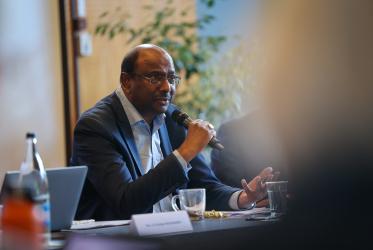The floods—occurring days before the UN Climate Change Conference (COP 28) in Dubai, United Arab Emirates—have hit Kenya, Somalia, Ethiopia, Burundi, and Malawi.
Rev. Titus Bere Komora, a Lutheran pastor in Tana Delta, a riverine region in Kenya's coastal region, has persistently urged the people to evacuate as the flood waters submerged villages.
“The situation is at the worst because the waters have spread to all areas. It is still raging and approaching towns,” said Komora, dean of the Coast Region of the Kenya Evangelical Lutheran Church. “[But] many people are heeding our call, following instructions and evacuating to safety.”
According to agencies, at least 130 people in Kenya, Ethiopia, and Somalia, have died from the flooding, the worst in recent times. It has also displaced thousands in the regions, which only months ago, faced a severe drought, which the United Nations described as the worst in 40 years.
“We need to make funds available to ensure we act in anticipation of such humanitarian crises and the continuity of essential services like healthcare facilities, schools, and child protection,” said Xevier Joubert, the Save the Children Ethiopia country director in a statement on 16 November.
Scientists say the flooding is resulting from El-Nino, a weather phenomenon associated with the unusual warming of the surface waters in the eastern tropical Pacific Ocean.
Komora said the people fleeing the floods had lost all their food after their farms were washed away. The new areas of settlement also lack the most basic services, including safe drinking water.
“We are not responding yet. We did not have any food in store or funds in place, but we have requested help from our central office. The office is trying to work with partners, so that we can see if we have mounted any interventions,” said the pastor.
He explained that the current situation means that there will be no food for the people for several months.
“The farms are flooded and cannot be cultivated any time soon. Another harvest can only come after three months. It means a long disaster for the people,” said the pastor.
At the same time, clerics say the floods stress the urgent need to move to tackle the global climate change crisis, especially at COP28.
Many hope for the acceleration of a loss and damage fund, agreed upon in COP 27 in Egypt, to provide financial assistance to nations suffering negative consequences of the climate crisis.
“The key issue is resources for adaptation. These must be given as grants not loans,” said Rev. Nicta Lubaale, general secretary of the Organization of African Instituted Churches.
“If you drive recklessly and crash into someone’s house, do you give the person a loan to repair the house?” queried Lubaale.
The leader noted that there have been attempts to develop agricultural insurance for farmers, but that did not replace the question of justice.
“Crops have been lost and soils destroyed by the intensity of heat, wind, and increased use of pesticides. That is why farmers need support for adaptation,” he said.
Lubaale hopes that leaders at the climate talks will focus on climate change adaptation and the plight of small scale farmers—who produce 70 percent of Africa’s food.







